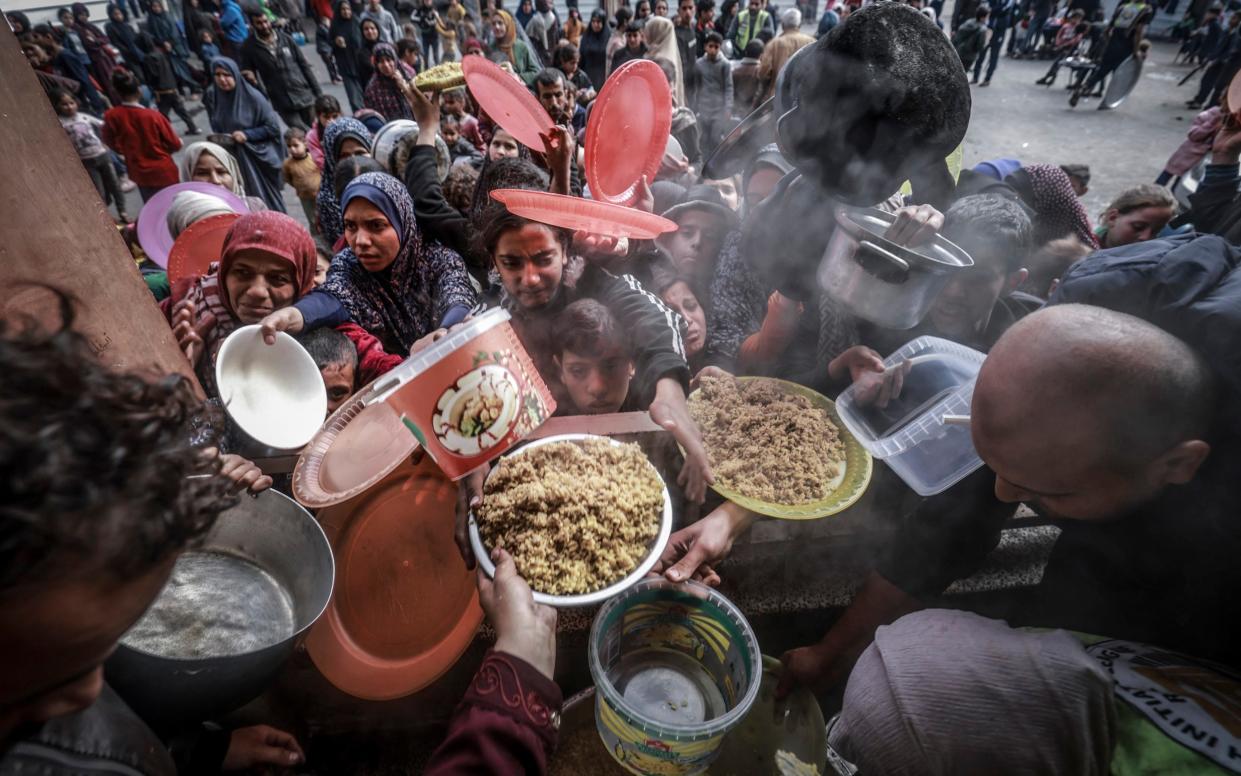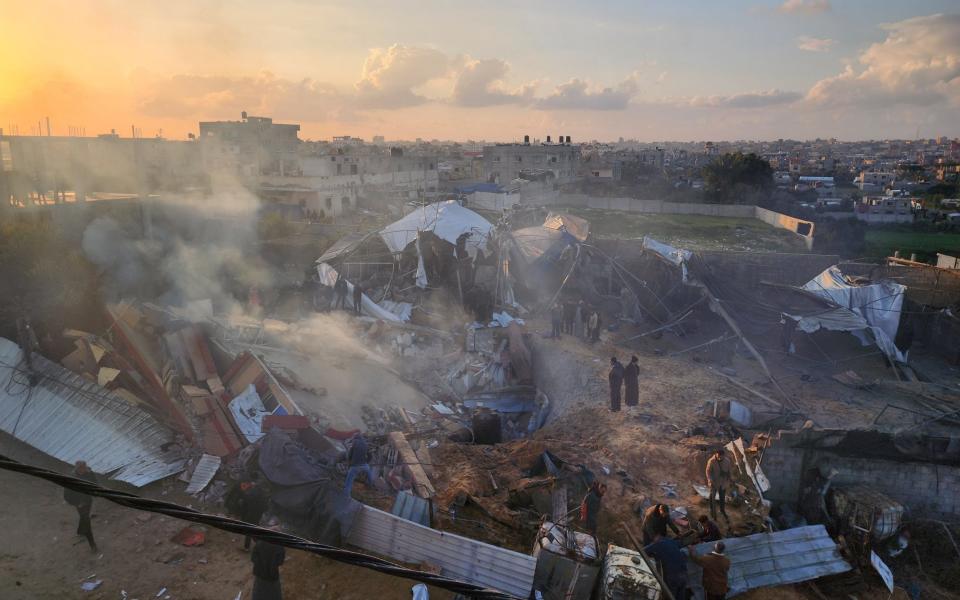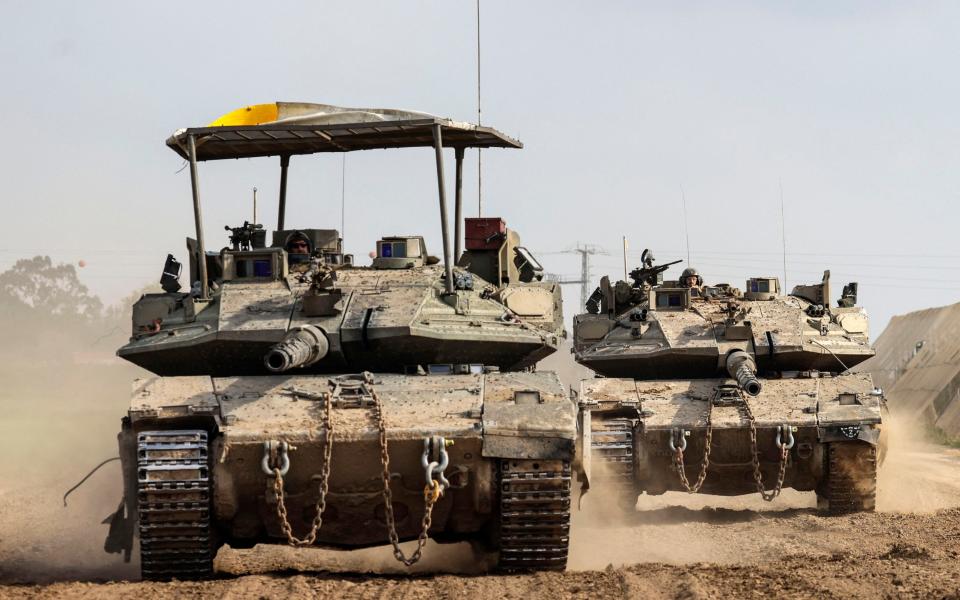US moves to stop Israel’s invasion of Rafah

The US said on Monday night that Israel’s planned invasion of Rafah “should not proceed under current circumstances” as it sought to use the UN to halt fighting.
Joe Biden is pushing for a United Nations vote on a “temporary ceasefire” in a break with the Israeli government as its troops prepare for an assault on the city, in south Gaza.
In a draft resolution, the US warns that a ground offensive into the city, where more than one million Palestinians are sheltering, would have “serious implications for regional peace and security”.
The move comes as Israel has rebuffed efforts by frustrated Western allies to call off its planned invasion of Rafah, the only remaining city controlled by Hamas.
It marks a departure from America’s initial position at the UN that Israel has the right to defend itself. Washington has twice vetoed council resolutions for a ceasefire in Gaza since the Hamas terror attack on Oct 7.
Mr Biden has raised concerns both privately and in public that Israel must create a plan to ensure the safety of the civilians sheltering in Rafah. US media reported that the president was considering a “breach” in the relationship with Israel.
US diplomats circulated its draft resolution on Monday after America rejected a rival Arab-backed vote for an end to fighting due to take place on Tuesday.
The US plan has not been scheduled for a vote, but is likely to be backed by the Security Council’s permanent members, including the UK.
It calls for a temporary ceasefire “as soon as practicable” alongside the lifting of blockades to aid delivery, and also demands Hamas releases all its hostages.
On Monday, Israel gave Hamas until March 10, the beginning of Ramadan, to hand over all hostages held in Gaza or it would order the ground assault on Rafah.
Around 1.4 million Palestinians, most of whom have been pushed from their homes in the north by Israel’s ground operations, are believed to be sheltering in the Gazan city on the Egyptian border.
On Monday, Benny Gantz, a member of the Israeli war cabinet, said: “To those saying the price [of an offensive] is too high, I say this very clearly: Hamas has a choice – they can surrender, release the hostages, and the citizens of Gaza will be able to celebrate the holy holiday of Ramadan.”
The Biden administration has reportedly urged Israel to finish the war by Ramadan, fearing that hostilities around the holiday could antagonise Muslims across the world.
It comes as international pressure on Israel continues to mount, with 26 out of 27 EU countries calling for an “immediate humanitarian pause that would lead to a sustainable ceasefire”.
Josep Borrell, the EU’s foreign policy chief, did not disclose which country had abstained, but Hungary reportedly blocked a similar initiative earlier.

Meanwhile, Sir Keir Starmer is under fierce pressure to back calls for an immediate ceasefire as he faces the threat of a fresh Labour rebellion over Gaza.
The party leader, who has been urged by Left-wing backbenchers to call for an end to the war, is braced for one of the toughest tests of his time in office on Wednesday when MPs vote for a second time on whether to support a truce.
He is widely expected to table his own amendment to an SNP motion in an attempt to see off a mutiny, but no final decision had been made as of Monday night.
The draft US text cited by Reuters urges “support for a temporary ceasefire in Gaza as soon as practicable”.
“Under current circumstances, a major ground offensive into Rafah would result in further harm to civilians and their further displacement including potentially into neighbouring countries,” it says, warning that the offensive was fraught with “serious implications for regional peace and security”.
The resolution would also reject “any actions by any party that reduce the territory of Gaza”, referring to the “buffer zone” Israel is building around the border area.

It was not immediately clear when or whether the draft resolution would be put to a vote in the 15-member council. To be adopted, a resolution needs at least nine votes in favour and no vetoes by the US, France, Britain, Russia or China.
The move appears to be a response to the move by Algeria on Saturday to request a Security Council vote later this week on its draft resolution demanding a ceasefire in Gaza.
Linda Thomas-Greenfield, the US ambassador to the UN, quickly signalled that it would be vetoed because it could jeopardise “sensitive negotiations” on hostages.
Unicef, the UN’s children’s agency, warned on Monday against the offensive as it called Rafah one of the most densely populated places on the planet. “They must be protected. They have no safe place to go,” it said.
Meanwhile, UN rights experts called for an independent investigation into alleged Israeli abuses targeted against Palestinian women and girls in the Gaza Strip and the West Bank, including killings, rapes and sexual assault.
The statement by the seven independent UN experts prompted an angry reaction from Israel, which rejected the “despicable and unfounded claims”.

